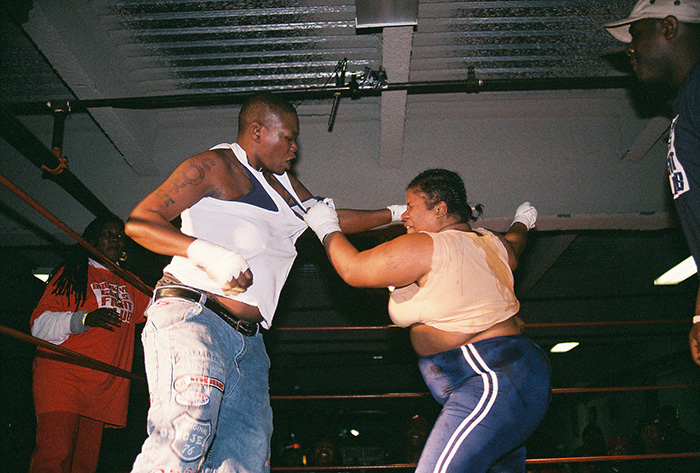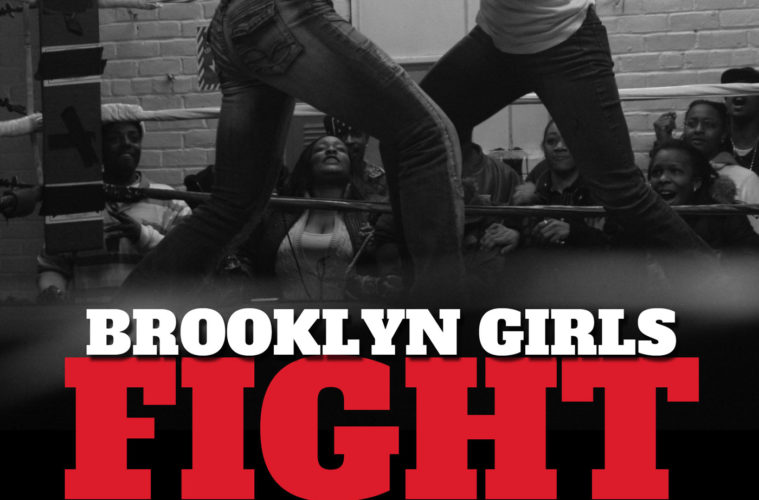Although it’s called Brooklyn Girls Fight Club and depicts more than a couple violent examples of those bare-knuckled brawls happening in undisclosed locales, producer Curvel Baptiste and director Courtney Carreras‘ documentary is really about life in Brownsville. A low-income neighborhood of east Brooklyn, this stretch of land is a hotbed for fights, shootings, and gang activity. While the men have gravitated to gunplay, however, the women still enjoy “poppin’ off” with their fists to earn credibility and glory in the streets. The underground fight club may provide them a venue for making quick, hard-fought money, but it doesn’t mean the world outside gets any easier. These ladies must do what they have to, surviving Brownsville and protecting their children takes precedence. Dragging a girl to the pavement by her hair is just common practice.
To understand the intricacies involved means finding fighters willing to give unbridled access. The three recruited prove a perfect sampling possessed by differing philosophies and pasts who each know what it takes. Kia (Bloody Knuckles) is a NYC fixture entering the ring to earn money so she may one day buy her kids sneakers without food stamps while their deadbeat fathers rot in jail or hustle. Her best friend Stephanie (Bloody Bulldog) is a self-proclaimed “playa” hooking up and dropping her men before love can form who smashes faces in the heavyweight class to bolster the image that got her voted in as a member of the Bloods. And Danielle (Do Her Thing) is the rarity that uses the club to win her three children an escape from the childhood she endured.
We watch them circle the ring as fans and bettors scream for blood while referees try to enforce the simple rules of “No Biting, Scratching, or Hair Pulling and No Weapons”. Ninety-second rounds commence with fighters converging and fists flying wild, connecting and missing as one woman eventually finds herself pinning the other to the floor. It’s a physically grueling, cathartic release of everyday struggle and frustration that for once starts and ends without future repercussions. But where the club would be a forum for violence in other cities so the brawling doesn’t spill into the streets, Brownsville is its own beast. Here the organized fisticuffs are merely an extension of what these women know and love. Whether for business, pleasure, or necessity, these fighters fight and have been since they learned to walk.

Beginning with footage from the winter of 2004 before fast-forwarding to summer 2005 and eventually summer 2007, the film’s real subject of single mothers getting by on limited resources quickly takes over. Carreras never passes judgment through her questions, attempting to educate herself and her audience on the truth behind one of Brooklyn’s toughest neighborhoods instead. We hear from an older generation of women spouting about how they are “OG”, others sadly admitting their daughters and granddaughters simply don’t comprehend their potential for making something of themselves, and a slew of twenty-somethings fearlessly walking around with an ever-vigilant attitude of knocking down anyone who gets in their way. One increasingly uncomfortable scene even shows Kia confronting her ex Kram for child support with fists raised and tempers blazing before turning calm on a dime.
Moments like this causes Brooklyn Girls Fight Club to become a tough movie to sit through. This is war and every punch landed is real. You can’t help wondering whether Kram would have knocked Kia out if the camera wasn’t there, his declarations of not wanting to fight always accompanied by eyes shifting our way. Our hearts go out to their young boys car gloating how badass their mother is. We cringe at a story referencing an eight-months pregnant woman losing her baby in a street brawl and cling to the hope Danielle gives when saying education is key for her kids and life in the suburbs her main goal. We can’t blame them for the thick skins and formidable demeanors cultivated over the years because there’s a good chance they’d be dead without them.
The life lesson we’re taught is to never visit Brownsville unless there’s a reason and someone’s got your back. Growing up in this life and learning the rules is one thing, but going in naïve and unprepared is a death wish. Raising a family means training fighters and accepting their absorption of the violent streak you yourself adopted many years ago. No one is exempt from destruction and selfishness often trumps selflessness depending on where one has come from and where he/she would like to go. Getting in the ring services both mentalities and therefore exists as a potential tool of help. It’s a culture outsiders love to believe doesn’t exist or try hard to rectify, but the truth is many of those trapped inside stay regardless of achieving a way out.
The film isn’t concerned with exposing a new cause worthy of pouring millions of dollars into fixing or enlisting charity workers and crusaders for assistance. Baptiste and Carreras are merely documenting a reality and subculture that has evolved within the environment housing it. Like it or hate it, fighting has become a staple in Brownsville passed on through the generations as a legitimate form of kill or be killed justice. It may not be legal or moral but it does align itself to the code its inhabitants have constructed. Whether the fight club is a product of the situation on the streets or one more cause to provoke humanity’s violence and teach our children physical abuse is an acceptable problem solver, in the end it’s the fighter alone who decides its value and utility.
Brooklyn Girls Fight Club is now on VOD.

